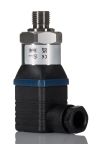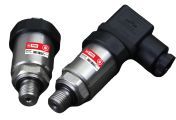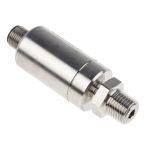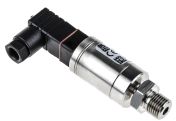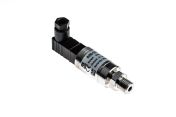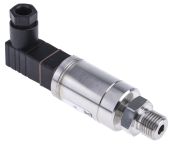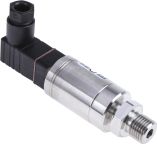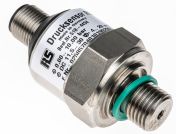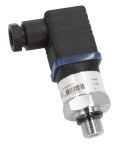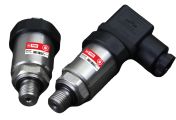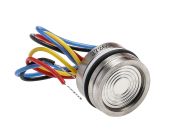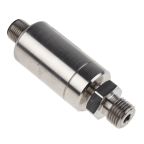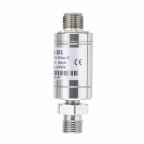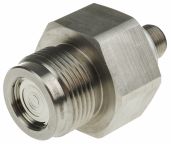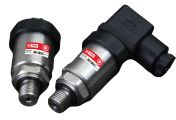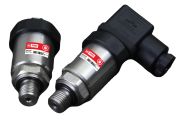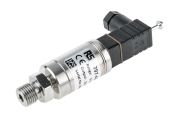Pressure Sensors
Pressure sensors are devices that sense the applied pressure of gases or liquids. The output of the measurement is then converted into an electrical signal which reflects the amount of pressure applied.
There are various sensor technologies used within pressure sensor devices. Depending on the measurement requirements, this can influence their sensing accuracy and reliability. The mechanical displacement within the sensor is turned into an electrical output signal which is achieved with 5 different methods.
- Resistive Sensors: These types of sensors use the change in electrical resistance of a strain gauge connected to the diaphragm.
- Capacitive Sensors: Are highly sensitive and are able to measure low pressure under 10 bar while still withstanding large overloads. This type of sensor is often used as a differential pressure sensor due to its precision.
- Piezoelectric Sensors: These sensors use substances like Quartz to generate a charge on the surface when pressure is applied. Piezoelectric pressure sensors are ideal for measuring fast changing pressures and are commonly used in pressure transducers.
- Optical Sensors: These use interferometry to measure pressure changes in optical fibre. They are not disturbed by EMI and can be used in noisy or medical environments.
- MEMS: Short for micro-electro-mechanical system and contains capacitive or piezo pressure sensing mechanisms on silicon at micron level resolution.
Types of Pressure Sensors
There are various properties which can be used to classify the type of sensor it is and its appropriate application, including; what pressure range they measure, their operating temperature range or the pressure type they measure.
- Absolute Pressure Sensor: This type of sensor measures pressure relative to the perfect vacuum (zero reference point).
- Gauge Pressure Sensors: These are often used to measure atmospheric pressure and are sometimes referred to as relative pressure sensors.
- Sealed Gauge Pressure Sensors: Similar to gauge pressure sensors except they measure pressure relative to a fixed pressure, not the current ambient atmospheric pressure which can vary.
- Differential Pressure Sensors: These can be used to measure the difference between two different pressures (differential pressure) which can be connected to either side of the sensor. They are often used to measure pressure drops, fluid levels and flow rates.
What Can Pressure Sensors Measure
Pressure sensors are versatile instruments that can be used to measure a wide variety of media. Some common types of media that can be measured using pressure sensors include:
- Gases: Pressure sensors are widely used to measure the pressure of gases such as air, nitrogen, oxygen, and natural gas. This is important for applications like pneumatic systems, gas flow control, and leak detection. Pressure sensors typically measure gas by detecting changes in properties between two points.
- Liquids: Pressure sensors can be used to measure the pressure of liquids like water, oil, fuel, and chemicals. This is crucial for applications such as hydraulic systems, liquid flow control, and tank level monitoring. Liquid pressure is typically measured by detecting the deflection in a diaphragm caused by the liquid.
- Slurries and Pastes: Pressure sensors can also be employed to measure the pressure of semi-solid materials like slurries and pastes. This is useful for applications involving the handling and processing of materials like cement, mining slurries, and food products. Pressure sensors measure these materials by detecting changes in strain on a diaphragm.
- Steam: Pressure sensors are used to monitor the pressure of steam in various industrial processes, such as power generation, heating systems, and autoclaves. Steam pressure sensors use diaphragms or piezoelectric elements that detect pressure changes due to steam force against the sensor's surface.
- Vacuum: Pressure sensors are essential for measuring the pressure in vacuum systems, which are used in applications like semiconductor manufacturing, scientific research, and medical equipment. They measure vacuum by comparing the measured presence to a reference vacuum in a sealed chamber.
By accurately measuring the pressure of these diverse media, pressure sensors play a vital role in a wide range of industries, including manufacturing, process control, automation, and environmental monitoring. The ability to precisely monitor and control pressure helps optimise system performance, ensure safety, and improve overall efficiency.
Pressure Sensor Applications
Pressure sensors are used in a wide variety of industrial applications due to their versatility and reliability. Here are some of the key industries where pressure sensors play a crucial role:
- Medical Industry: Pressure sensors are essential in medical devices such as ventilators, blood pressure monitors, and infusion pumps. They ensure accurate and reliable measurements of vital parameters, contributing to patient safety and effective treatment.
- Aviation Industry: In aviation, pressure sensors are used to monitor and control cabin pressure, fuel systems, and hydraulic systems. They help maintain optimal operating conditions and ensure the safety and efficiency of flights.
- Automotive Industry: Pressure sensors in the automotive industry are used for monitoring tire pressure, fuel pressure, and engine performance. They contribute to vehicle safety, efficiency, and emissions control.
- Marine Industry: In marine applications, pressure sensors are used to monitor and control ballast tanks, engine systems, and environmental conditions. They ensure safe and efficient operation of marine vessels.
- Industrial Manufacturing: Pressure sensors are widely used in industrial manufacturing to monitor and control processes involving gases and liquids. They help maintain product quality, process efficiency, and safety.
- Oil and Gas Industry: Pressure sensors are critical in the oil and gas industry for monitoring well pressures, pipeline pressures, and safety systems. They ensure the safe extraction, transportation, and processing of oil and gas.
- HVAC Systems: In heating, ventilation, and air conditioning (HVAC) systems, pressure sensors are used to monitor and control air and refrigerant pressures. They help maintain comfort, efficiency, and system reliability.
Buying Pressure Sensors: Ordering & Delivery
RS is a trusted supplier and distributor of a comprehensive range of pressure sensors, including differential pressure sensors, pressure transducers, and more. We stock a variety of industry-leading brands such as: Amphenol Advanced Sensors, Endress + Hauser, Gems Sensors, Honeywell and more.
To place an order online, simply browse our extensive catalogue, filter and select your preferred products based on your specifications. RS Singapore offers fast delivery of pressure sensors. For more details on delivery services and fees, please refer to our Delivery Page.
Popular Searches
Related links
- Sensirion SEK-SDP8xx for Evaluation of the SDP810-500 Pa Sensor Differential Pressure Sensor Evaluation Kit for
- Sensirion SEK-SDP31 for Evaluation of the SDP31 Sensor Differential Pressure Sensor Evaluation Kit for SDP31 SDP3x
- Differential pressure transducer
- MikroElektronika Diff Press 2 Click Differential Pressure Sensor Add On Board for SDP31-500PA mikroBUS socket
- Omron Pressure Sensor 50kPa Max Relative Reading
- NXP Differential Pressure Sensor
- Pneumatic Pressure Sensors
- Honeywell Differential Pressure Sensor 10 V dc

